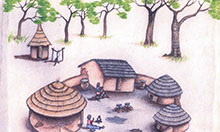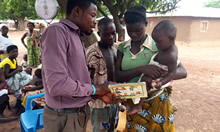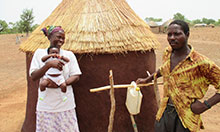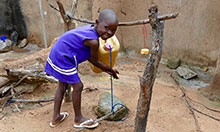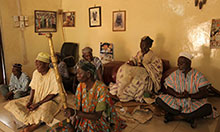SPRING/Ghana’s WASH 1,000 Approach to Support Nutrition
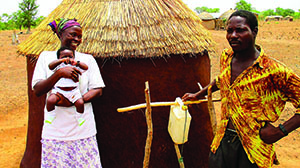
Background
The first 1,000 days, the period from pregnancy to two years of age, are critical for early childhood development. During this time, children are especially vulnerable to stunting, an irreversible condition that can result in lifelong cognitive and physical deficits. In 2011, stunting, or low height-for-age, affected more than 165 million children worldwide (Black et al. 2013).
Mounting evidence indicates that poor water, sanitation, and hygiene (WASH) practices contribute significantly to stunting. Improving WASH practices reduces diarrheal disease, environmental enteric dysfunction,1 and soil-transmitted helminth (parasitic worm) infections. Combined, these reductions contribute to decreases in stunting.
In Ghana, stunting is a particularly serious challenge. According to the 2014 Ghana Demographic and Health Survey (GDHS), 19 percent of Ghanaian children under the age of 5 are stunted. Among the regions with the highest rates of stunting is the Northern Region, where the prevalence is 33 percent (GDHS 2014). WASH practices in many parts of the country contribute to this problem. The majority of households (93 percent) do not treat their drinking water by any method (GDHS 2014), while only 14 percent use an improved toilet facility that is not shared with other households (GDHS 2014). In the two weeks preceding the 2014 GDHS survey, the overall rate of diarrhea reported among children under five was 12 percent, a figure which tends to vary seasonally.
SPRING/Ghana’s WASH 1,000 Strategy
The SPRING project is a seven-year USAID-funded cooperative agreement to strengthen global and country efforts to scale up high-impact nutrition practices and policies and improve maternal and child nutrition outcomes. SPRING has worked for three years in Ghana, where USAID has tasked it with helping to prevent stunting and reduce anemia in the Feed the Future Zone of Influence in 15 districts in the Upper East and Northern Regions.
SPRING’s “WASH 1,000” strategy promotes focused, evidence-based WASH behaviors to eliminate common fecal-oral contamination pathways in children during the first 1,000 days. The strategy takes an integrated, multi-sectoral approach, simultaneously delivering products, services, and information to households with pregnant and lactating women and those with children under two (i.e., 1,000-day households).
Four Key WASH Behaviors
SPRING/Ghana’s WASH 1,000 strategy seeks to promote the adoption of four evidence-based household behaviors that allow communities to achieve a “clean household status.” The behaviors include:
- Washing hands with soap at the appropriate times for all caregivers (mother, siblings, others). At a minimum, hands should be washed prior to food preparation and feeding the child, and after defecation or handling infant/child feces.
- Safely disposing of adult and child feces in a latrine.
- Creating clean play spaces that separate children from environmental contaminants (soil, animal feces, human feces), especially for children under two years of age.
- Disinfecting drinking water (most commonly through boiling) for children between the ages of six months (when water is first introduced after exclusive breastfeeding) and two years.
The Existing Enabling Environment
The Government of Ghana’s National Sanitation Strategy promotes a Community-Led Total Sanitation (CLTS) process to achieve open-defecation free (ODF) communities. We support this strategy by using the Government of Ghana’s standard CLTS methodology and materials. We also incorporate nutrition-sensitive WASH messages into the CLTS process and other WASH activities. These behaviors are promoted to improve child growth and development.
The WASH 1,000 Implementation Process
SPRING/Ghana’s WASH 1,000 efforts begin with sensitization and demand-creation in the community using the CLTS approach, which involves three phases: pre-triggering, triggering, and post-triggering activities.
- In collaboration with the District Environmental Health and Community Development Units, we conduct a preliminary pre-triggering phase to identify and establish a relationship with the community before working through the CLTS approach. Pre-triggering activities include community selection, community entry, community mobilization, and participatory sanitation profiling of the community.2 These preparatory activities allow SPRING/Ghana to gain community buy-in to the CLTS process and to confirm an acceptable date to begin the triggering phase.
- In the triggering phase, the change process is initiated with community members. In collaboration with district staff, we facilitate a process through which the community analyzes its sanitation status by taking stock of its existing sanitation practices, with the aim of achieving awareness that open defecation is harmful to the community. Action plans are then developed for the school and community to ensure that each household makes improvements in practicing the four key WASH behaviors. Copies of each action plan are kept in the community for subsequent monitoring activities by district environmental health officers. During this process, we also identify “natural leaders,” both men and women, who will support community members in latrine construction and adoption of the four key behaviors. These natural leaders are positive deviants or influential community leaders who demonstrate a strong resolve to improve community cleanliness by facilitating the construction of latrines and tippy taps (inexpensive and water-saving handwashing stations), advocating for their use, and working to instill a communal sense of ownership for local cleanliness. Natural leaders were incentivized through rigorous capacity building, which included field trips and community self-assessment (a process that takes place before a community is verified as ODF).
- In the post-triggering phase, activities in the community action plan are implemented. Environmental Health Officers make follow-up visits to offer technical support to some communal activities (construction of latrines and soakaway systems), promote the adoption of the four key behaviors, and ensure that cleanliness improvements are implemented and maintained.
Sustained Behavior Promotion and Monitoring: Working Across Community Groups and Media Platforms to Reinforce WASH Messages
In an effort to sustain household motivation to practice the four WASH 1,000 behaviors, we deliver key WASH messages through mass media, community groups, and direct contact with households and communities. We work with the following groups and platforms to reinforce WASH 1,000 interventions started under CLTS:
| Group or Platform | Purpose | Collaboration with SPRING |
|---|---|---|
| Community mass media via cinema shows by Information Service Department | Provide platform to motivate, reinforce, and support community-wide action on WASH behaviors. | Disseminate SPRING’s WASH video dramas. |
| Radio stations | Provide additional source of information to complement interpersonal communication by encouraging and reinforcing WASH related behaviors. | 8 radio stations in 6 languages with good coverage across implementing districts air SPRING’s “Shrubs of Today Become Tomorrow’s Forest” radio series. |
| Natural leaders, water sanitation management teams (WSMTs) |
|
|
| Mother-to-mother support groups (MTMSGs) and farmer field schools |
| SPRING has integrated WASH 1,000 behaviors into the farmer field school training guide used by meeting facilitators. |
| SPRINGSchool health clubs and school health teachers |
| SPRING trains school health club facilitators and teachers on WASH 1,000 behaviors. |
| Community health workers |
| SPRING trains community health workers on IYCF, anemia, and the WASH 1,000 behaviors. |
| Community social/political structure and government agencies | The village chiefs oversee the day-to-day running of each village. They ensure the rules are set and followed and work with the elected assembly person to ensure that the village is well represented in district politics. | SPRING supports natural leaders in calling meetings to discuss WASH 1,000 improvements and ensure that households practice the four key behaviors. |
| Environmental Health Officers (EHOs) and Community Development Units |
| SPRING provided refresher trainings for all EHOs in Upper East and Northern Regions. They are engaged in the CLTS process, and undertake routine monitoring household visits to encourage the adoption and sustainment of the WASH 1,000 behaviors. |
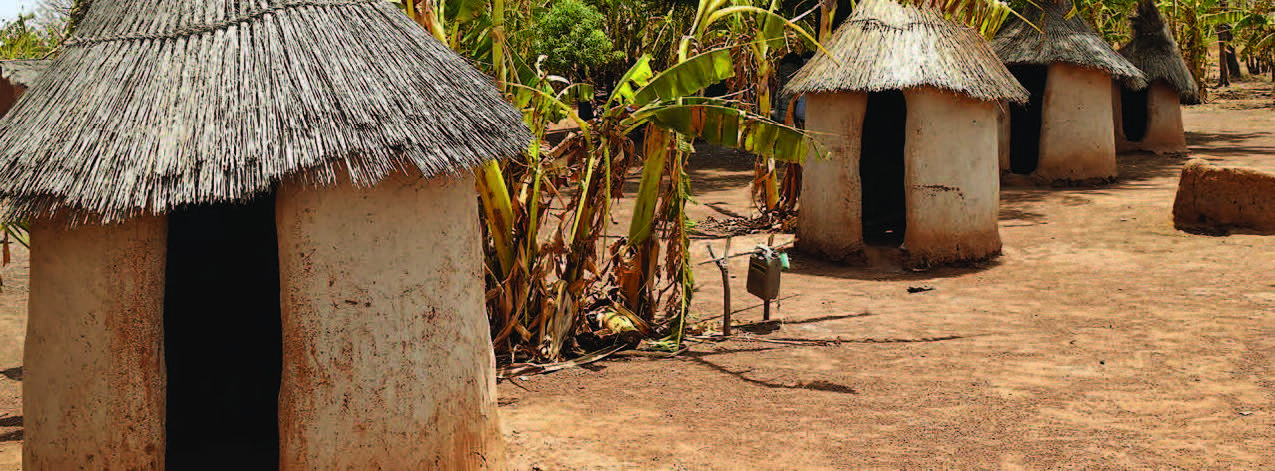
Key WASH 1,000 Results
SPRING/Ghana’s WASH 1,000 approach has largely been successful, as communities have embraced the WASH 1,000 key behaviors as the best way to improve and maintain the nutritional status of children for better growth. In particular:
- 6,756 latrines have been constructed by households (using their own resources) across all 15 districts and 405 communities, leading to a reduction in open defecation and increased safe disposal of adult and child feces through a latrine.
- As a result of latrine construction and use, 154 out of 300 of SPRING/Ghana target communities for FY 15 and FY 16 have been declared ODF.
- 9,235 tippy taps (5,658 constructed near latrines and 3,577 constructed in household yards and other locations) have been constructed to make handwashing during critical times of the day more convenient.
- We have reached 124 schools and trained 2,801 students, 74 teachers, and 251 SHEP coordinators in WASH 1,000.
- Through the airing of SPRING’s WASH 1,000 video drama in communities, 63,390 people were reached to motivate, encourage, and reinforce the uptake of key behaviors.
- By viewing the WASH 1,000 video drama, Kpatia-Tengre, a non-SPRING intervention community in the Talensi District of Upper East Region was triggered and, through follow-up visits by district facilitators, the community has become ODF.
- In each community, we have trained and put in place a natural leaders group and a water and sanitation management team, comprising 2,168 and 3,072 members respectively.
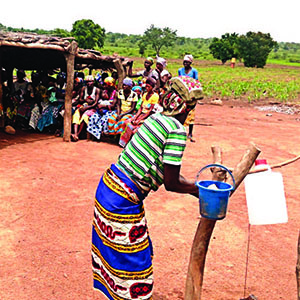
Policy Integration: Using SPRING’s WASH 1,000 Approach to Support the National WASH Strategy
The Government of Ghana implements CLTS to accelerate the population’s access to and use of basic sanitation facilities. While SPRING/Ghana’s WASH 1,000 strategy implements CLTS to contribute to national ODF targets, integrating the project’s WASH 1,000 behaviors into the CLTS approach may accelerate improvement of nutrition outcomes in children under two.
We have been sharing our experiences and successes to contribute to national WASH implementation strategies. In particular, we have contributed to advancements in WASH by—
- Promoting more handwashing stations within the household to make handwashing more convenient and frequent. The Government of Ghana’s CLTS approach emphasizes a handwashing point near the latrine to reduce consumption of fecal matter. In line with mounting evidence, SPRING/Ghana also promotes the use of tippy taps within the household compound as a cue for handwashing with soap or ash at other critical times.
- Focusing on animal and human feces during the triggering phase. The triggering phase in the WASH 1,000 approach aims to make communities and households aware of not just human feces, but also animal feces, soil, and other environmental contaminants. The goal of the triggering phase is to reduce environmental contamination in the home. Therefore, CLTS triggering activities focus on reducing human and animal fecal contamination in and around the home. SPRING/Ghana’s WASH 1,000 approach ensures that the courtyard in households where children play are free of animal feces by negotiating with households on the best way to ensure that animals stay away from the living, sleeping, and cooking areas.
- Promoting the boiling of drinking water in all households. The Government of Ghana’s National Household Water Treatment and Safe Storage Strategy promotes household water treatment technologies to improve water quality. The strategy also encourages the use of safe water transportation and storage, especially among households without access to an improved water source. SPRING/Ghana conducted a baseline survey, which included data on household water disinfection practices. After analyzing common household practices and determining that households have low access to water treatment technologies in local markets, we decided to encourage households—especially those with children ages 6 to 24 months—to boil drinking water. Since water collected from a safe water source can be re-contaminated during transportation and storage, SPRING/Ghana promotes consistent boiling of drinking water, regardless of the presence of an improved community water source.
- Bringing the “clean” concept to households. The “clean” concept is emerging as a common thread within Ghana’s WASH policy agenda. Achieving ODF status is a measure of basic community cleanliness. In other countries, this concept is sometimes labeled as a “clean village” approach. We work through district and regional Environmental Health and Sanitation Departments (EHSDs) and Community Development Departments to establish a basic level of household and community cleanliness through the four WASH 1,000 behaviors.
- Strengthening ties with the government through WASH forums. Through national and regional WASH forums, such as the national and regional CLTS stock-taking forums, we are strengthening ties with the Ministry of Health, the Ministry of Local Government, and the Ghana Education Service to increase national-level awareness and support for the WASH 1,000 approach. These agencies have systems and personnel operating in SPRING focus districts that serve as additional platforms for promoting the WASH 1,000 approach.
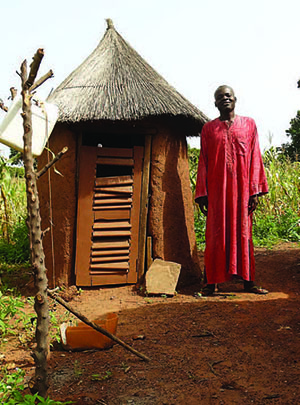
Success Story
Benefits of Latrine Use
Kpegu, a SPRING-supported community in the Kumbungu District with a population of 529 and 25 households, was declared open-defecation free in 2015. It still maintains its status. Abukari Imoro, head of a 20-person household, has built two latrines: one for males and one for females. “The benefits [of latrine use] are numerous,” Abukari said. “Firstly, we no longer go far to defecate. This saves us time to engage in other activities. Second, we realized that after stopping open defecation and building latrines, the diseases like diarrhea, cholera, [and] dysentery have reduced drastically in the community. Now, with the construction of latrines, we are safe from snake bites. Hitherto, there were frequent cases of snake bites during defecation in the bush.” “I have two latrines,” he continued. “One for males and the other for females. This arrangement and utilization brings dignity to both males and females, as none will be worried of [being] seen by the opposite sex.”
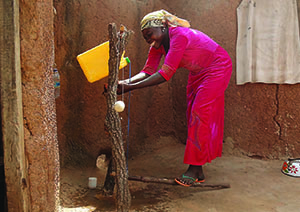
Success Story
Benefits of Handwashing with Soap
Rukaya Mohammed, also from Kpegu, was seen washing her hands with soap at a 12-person household.
“I always wash my hands with soap before cooking, before feeding the child, [and] after visiting the latrine to avoid passing on germs to the children, which will make them fall sick,” she said.
“We built tippy taps within the house and by the latrine to make sure that the handwashing facility was not far from us for easy access before cooking or feeding the child, or [to] wash hands after using the latrine,” she continued. “Before my adoption of handwashing with soap before feeding a child, my children fell ill easily from diarrhea, and the nurses said at the time that my children were malnourished. However, [as a result] of my frequent visits to the clinic and my adoption of handwashing with soap before feeding, my current child, Ismatu, is recording a steady growth. Thanks to SPRING/Ghana for educating us through the Environmental Health Officers.”
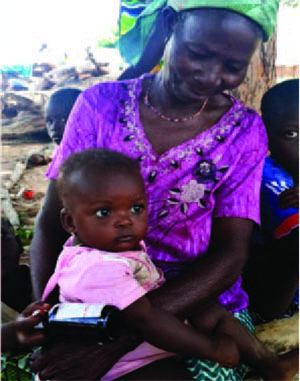
Success Story
Creating Clean Play Spaces for Children
Before SPRING/Ghana introduced the WASH 1,000 program in 2015, there was not a single latrine in the Toroyili community in Tolon District, and no handwashing facilities. Open defecation was the prevailing practice. It was also common to find a domestic animal or bird pecking from the food bowl while children ate, making it highly possible for children’s food to be contaminated, or even for a child to eat the feces of the birds or animals.
Memunatu Alhassan, a member of Toroyili community and the chief’s wife, was very passionate and active during visits to the community to engage members in SPRING/Ghana’s WASH 1,000 program. She was one of the early adopters, taking the initiative to construct a latrine and two tippy taps—one inside the house and the other at the latrine site. Memunatu is even more concerned about children coming into contact with and eating the feces of birds.
Following introduction of SPRING’s behavior change messaging and encouragement to practice the WASH 1,000 behaviors, Memunatu now feeds her chickens outside the compound to limit their presence in the yard, and always endeavors to tidy up the space. She has noted that when children fall sick, the mother and the whole family are disturbed, so it is good to prevent this from occurring frequently.
In addition to her personal initiative, Memunatu championed SPRING/Ghana’s WASH 1,000 agenda in her community. She is using her status as the chief’s wife to mobilize community members (especially women) to promote WASH 1,000 behaviors.
With guidance from SPRING/Ghana, facilitation by the district EHOs, and the instrumentality of champions such as Memunatu, Toroyili community has constructed 10 latrines for 10 households, as well as 13 tippy tap stands fitted with soap for handwashing. Community members are also making a conscious effort to keep compounds free of chicken droppings (feeding chickens outside the house), wash hands before feeding children, and actively observe older children when eating.
Available Resources
When a King has Good Counsellors, His Reign is Peaceful advocacy video
Shrubs of Today Become Tomorrow’s Forest radio serial
To view the original version with more images and resources, please download the full brief above.
Footnotes
1 A syndrome of inflammation, reduced absorptive capacity, and reduced barrier function in the small intestine
2 Participatory sanitation profiling is a method of data collection that enlists community members in gathering pre-intervention WASH data, such as number of latrines, water points, refuse dumps, etc.
References
Black, Robert E. et al. “Maternal and child undernutrition and overweight in low-income and middle-income countries.” The Lancet 382 (9890): 427–451. doi:10.1016/S0140-6736(13)60937-X.
Ghana Statistical Service (GSS), Ghana Health Service (GHS), and ICF International. 2015. Ghana Demographic and Health Survey 2014. Rockville, Maryland, USA: GSS, GHS, and ICF International.
